Before we address this delicate issue, we would like to express from the start that our intention is not denigrate any person, no matter what his or her sexual attitudes are. Our purpose is to shed the objective light of God’s Word on the topic of transgenderism, not to personally condemn anybody. Only God can judge a person’s heart.
However, God did give us His Word so that we can judge human activity from the spiritual and moral perspective. Otherwise, we would not know how He wants us to live and be saved. There is ample evidence of this in the Bible. God gave us His Ten Commandments (see Ex. 20:1-17; Deut. 5:1-21). Jesus perfected our understanding of the Commandments, especially in his Sermon on the Mount (see Matt. 5-7).
Therefore, our purpose is to share what God teaches us in the Bible about the issue of transgenderism from an objective perspective without entertaining any judgment about the subjective guilt of any person.

There are seven points of inquiry we must address:
- What is transgenderism?
- What is gender?
- What the Bible says about transgenderism
- How we arrive at a correct interpretation of the Bible
- What biblical principles we can apply to the issue of transgenderism
- The argument of biologism
- How we should treat persons who call themselves transgender
What Is Transgenderism?
Transgenderism refers to the idea that there are persons whose inner experience of their own sexual identity does not coincide with their biological sex. These persons may also wish to change to or identify with the opposite sex.
Some people who claim they are transgender even go so far as to say that they do not identify with either of the two sexes, or with any “gender” for that matter. They call themselves “non-binary,” that is to say, they do not identify with either of the two (bi) sexes: male or female.
What Is Gender?
It is important to clarify from the start that the term “gender” as used by promoters of gender ideology is not a scientific term. It is rather a term that has been invented to refer to the sexual identity a person claims he or she experiences interiorly, independently of his or her biological sex. As such, the term gender is an ideological term; its original meaning has been devoid of its proper content in order to promote an ideology that has no objective basis in either biological science or anthropology.
Up to the 1950’s, the term “gender” was used in the European languages to refer to things, not to persons. In Spanish, for example, this is very clear. We refer to “la casa” (“the house”) as feminine or to “el lápiz” (“the pencil”) as masculine.
However, in that decade certain sexologists decided to use the term “gender” to refer to the inner experience of a person’s sexual identity. These sexologists were not happy with the term “transsexual” because it was too tied to the term “sex,” which admits of only the two sexes. For these sexologists the term “gender” was more fluid. It allowed for as many “genders” as there are people who do not identify with either of the two sexes.
One of these sexologists was John Money, professor at Johns Hopkins University from the 1950’s until his death in 2006. In fact, he “was among the most prominent of these sexologists who redefined gender to mean ‘the social performance indicative of an internal sexed identity.’”
What Does the Bible Say about Transgenderism?
As we stated above, our purpose is to show what the Bible says about transgenderism. But the fact of the matter is that the Bible says nothing about this issue. There are many issues the Bible says nothing explicitly about.
For example, the Bible says nothing about abortion. But we can rely on sound biblical principles to demonstrate that according to the Bible, abortion is always seriously wrong. The Bible teaches us that we should never kill innocent people (Ex. 20:13; 23:7) and that there is a living human being inside a pregnant woman (cf. Ps. 139:13-15 and many others).
In the case of transgenderism, it is more difficult to find principles in the Bible that directly shed light on it, because of the nature of the issue itself. As we have already pointed out, transgenderism originates in a person’s subjective feelings. It is not in itself an objective outward reality, as is the case with abortion. Its outward expression depends entirely on the person’s inner world.
It is true that the Bible does address the problem of homosexual relations. But transgenderism is not the same as homosexuality. People who claim to be transgender do not necessarily claim to have feelings of sexual attraction to persons of their same sex; rather, they claim they want to be the other sex, or neither sex.
Nevertheless, the Bible does have an anthropology, a view on the human person, that sheds light on the issue of transgenderism. But the problem is, what is the correct way of interpreting biblical anthropology? There are Christians who believe in the Bible and yet claim that the biblical passages that condemn homosexual activity cannot be interpreted as condemning committed homosexual partnerships. These same Christians claim the Bible does not reject transgenderism.
The Christians who make such a claim do not explain at all what are the biblical reasons for making it. They point to the modern experience of homosexuality and transgenderism and conclude that the Bible needs to be interpreted anew in the light of such experiences. But this is the opposite of the truth. Christ taught us in so many ways that we should interpret human experience in the light of his eternal Word, not the other way around. Practically speaking, the entire Bible teaches us this truth. The following passage from St. Paul, Apostle of Christ, is emblematic about this issue:
Do not be conformed to this world but be transformed by the renewal of your mind, that you may prove what is the will of God, what is good and acceptable and perfect. (Rom. 12:2)
And we have already shown that the will of God is expressed by means of His Commandments, which, oftentimes have run counter to the wishes of many people through the history of humanity.
Sadly, the Christian world nowadays presents us with the spectacle of many Christians who interpret the Bible in radically and opposite different ways. And all of those Christians, especially if they are pastors, claim to have the correct interpretation of the Bible. Ironically, they all claim the Bible contains the Word of God and that His Word is infallible.
How do we solve this problem? Which Christians are right and which Christians are wrong?
How Do We Correctly Interpret the Bible?
One thing is clear. The Bible is indeed inerrant in all that has to do with our salvation. The Catholic Church teaches us that since the Holy Spirit inspired the sacred authors of the Bible, the written Word of God is free from all error regarding our salvation:
Since therefore all that the inspired authors or sacred writers affirm should be regarded as affirmed by the Holy Spirit, we must acknowledge that the books of Scripture firmly, faithfully, and without error teach that truth which God, for the sake of our salvation, wished to see confided to the Sacred Scriptures. (Catechism of the Catholic Church 107)
But the problem still stands. The Bible is infallible, but we are not infallible. We can all err in our interpretation. We could ask the uncomfortable question: Of what use is an infallible document if we ourselves, who are not infallible, attempt to interpret it infallibly?
The logical answer to this dilemma is that the Bible by itself is not enough to arrive at a correct interpretation of the Word of God. We need a divinely-appointed authority external to the Bible that can interpret it for us infallibly. Christ, who promised us that the gates of Hell would not prevail against his Church (Matt. 16:18), gave us that authority: The Magisterium of the Catholic Church, that is, the Pope and the Bishops who are in communion with him. How could Jesus, who infinitely loved us, leave us without any tangible guidance towards the Truth?
The task of giving an authentic interpretation of the Word of God, whether in its written form or in the form of Tradition, has been entrusted to the living teaching office of the Church alone. Its authority in this matter is exercised in the name of Jesus Christ. This means that the task of interpretation has been entrusted to the bishops in communion with the successor of Peter, the Bishop of Rome. (CCC 85, emphasis added.)
Christ himself gave this authority to St. Peter, the first Pope, when he told him:
“But you,” He asked them, “who do you say that I am?” Simon Peter answered, “You are the Messiah, the Son of the living God!” And Jesus responded, “Simon son of Jonah, you are blessed because flesh and blood did not reveal this to you, but My Father in Heaven. And I also say to you that you are Peter, and on this rock I will build My Church, and the forces of Hell will not overpower it. I will give you the keys of the Kingdom of Heaven, and whatever you bind on earth is already bound in Heaven, and whatever you loose on earth is already loosed in Heaven.” (Matt. 16:15-19)

Christ Handing the Keys to St. Peter by Pietro Perugino
Christ also gave this authority, under St. Peter, to the other Apostles: “He who hears you hears me, and he who rejects you rejects me, and he who rejects me rejects him who sent me” (Luke 10:16). In other words, he who rejects the teaching of the Apostles and their successors, Popes and Bishops, rejects God Himself, since the Magisterium teaches the Word of God.
To fulfill their exalted mission, the apostles were endowed by Christ with a special outpouring of the Holy Spirit coming upon them, and by the imposition of hands they passed on to their auxiliaries the gift of the Spirit, which is transmitted down to our day through episcopal consecration. (CCC 1556, see also Acts 1:8, 2:4; John 20:22-23; 1 Tim. 4:14; 2 Tim. 1:6-7)
Many people, upon learning this truth, will jump from their seats in anger and claim that the Magisterium of the Catholic Church has a monopoly of God’s Word and does not let anybody else interpret the Bible for their own spiritual benefit. But the very opposite is the truth. Under the guidance of the Magisterium, we are all free from error and can, with peace of heart and soul, interpret and apply the Bible correctly to our own lives. Moreover, we can also help others interpret the Bible without falling into error. What we need to do is to assiduously study what the Magisterium teaches from the Word of God through the Catechism and other Church documents about the problems we face today, including transgenderism.
However, the problem that we have long had is that we as individuals and as a society have become so arrogant that we do not accept that a teaching body appointed by God Himself can teach us the Truth about God and about ourselves. We claim that we are so smart and so “full of the Holy Spirit” that we can interpret the Bible by ourselves individually without the mediation of anybody else. But our very first Pope, St. Peter himself, warned us against such an individualistic and twisted interpretation of the Scriptures:
Bear in mind that our Lord’s patience means salvation, just as our dear brother Paul also wrote you with the wisdom that God gave him. He writes the same way in all his letters, speaking in them of these matters. His letters contain some things that are hard to understand, which ignorant and unstable people distort, as they do the other Scriptures, to their own destruction/ (2 Pet. 3:15-16)
What other Christian body of believers can claim that they have an infallible teaching of the Bible that comes all the way back to Christ and the Apostles without interruption? Only the Catholic Church can make such a claim. Despite all the sins and errors committed by some of her individual members, no Pope or Bishop in communion with him, in his official capacity as teacher of all of the faithful, has taught something contrary to the Word of God.
What Biblical Principles Can We Apply to the Issue of Transgenderism?
Once we have clarified the issue of a correct interpretation of the Bible, we now face the task of showing what biblical principles we can apply to transgenderism. The most obvious principle is the fact that, from the very beginning, God created man and woman and no other sex or “gender.”
Then God said, “Let us make mankind in our image, in our likeness, so that they may rule over the fish in the sea and the birds in the sky, over the livestock and all the wild animals, and over all the creatures that move along the ground.” So God created mankind in his own image, in the image of God he created them; male and female he created them. God blessed them and said to them, “Be fruitful and increase in number; fill the earth and subdue it. Rule over the fish in the sea and the birds in the sky and over every living creature that moves on the ground.” (Gen. 1:26-28)
Furthermore, God created marriage between a man and a woman from the very beginning: “That is why a man leaves his father and mother and is united to his wife, and they become one flesh” (Gen. 2:24).
St. Paul quotes this latter passage when he teaches that marriage between a Christian man and a Christian woman is a reflection of the spiritual marriage between Christ and His Church:
Husbands, love your wives, just as Christ loved the Church and gave himself up for her to make her holy, cleansing her by the washing with water through the word, and to present her to himself as a radiant church, without stain or wrinkle or any other blemish, but holy and blameless. In this same way, husbands ought to love their wives as their own bodies. He who loves his wife loves himself. After all, no one ever hated their own body, but they feed and care for their body, just as Christ does the Church— for we are members of his body. “For this reason a man will leave his father and mother and be united to his wife, and the two will become one flesh.” This is a profound mystery—but I am talking about Christ and the Church.
Christians who claim the Bible is not against transgenderism or homosexual activity recognize that the Bible is indeed teaching here that marriage between a man and a woman is a reflection of the marriage between Christ and His Church. They may also accept that marriage is based on the complementarity between a man and a woman. But then they claim that such complementarity can also exist, at the spiritual level, between two persons of the same sex. According to them, the human body is not absolutely necessary to establish complementarity, and neither is the sexual union that is the basis of marriage, and so they extend this disregard for the body to claim that the Bible is not against persons who desire to “change their sex.”
But this is pure voluntarism, an argument based mainly on the will. “This is so because I will it so,” which is, of course, a circular and thus invalid argument. But the fact of the matter is that both Genesis 2:24 and Ephesians 5:25-32 base marriage on the union of the bodies of man and woman. Of course, this union presupposes a spiritual union, which is expressed in the conjugal language of the body. But the human body cannot be disregarded; it is essential to establish the objectivity of the marriage covenant.
The human body is an objective, tangible reality and simultaneously has a sacramental dimension. That is to say, it is through the human body and other physical, symbolic gestures and objects that sacramental grace is imparted to us, in consonance with the undeniable fact that we are, and forever will be in eternity, both embodied and spiritual beings. The supreme form of this sacramentality of the body is the body of Christ himself. In fact, the most important sacrament, the Eucharist, consists precisely in the Body and Blood of Christ.
The body is an intrinsic dimension of our human nature. The way God created the male and female bodies is the first message of God about who we are as persons. To reject the essentiality of the body, male and female, is to reject God’s gift to us. Such rejection is also an attempt of the human person to act “like God” and “create” other sexes or “genders” by a pure act of the will and the consequent use of harmful and life-devastating hormones and mutilations. God has gifted us with bodies He designed in a concrete way: male and female. We should humbly and gratefully accept this gift and give glory to God through our bodies:
Therefore, I urge you, brothers and sisters, in view of God’s mercy, to offer your bodies as a living sacrifice, holy and pleasing to God—this is your true and proper worship. (Rom. 12:1)
There is no evidence whatsoever in the Bible, nor in the teaching of the Church throughout history up to the present day, that God intended to create other sexes or “genders.” To claim that God must approve of transgenderism because the Bible does not explicitly condemn it is simply an exercise in sheer voluntarism, as just explained.
Transgenderism, the desire to “change one’s sex,” is an emotional disorder because it does not correspond to the reality of who we are. As such, it should be treated professionally with kindness and charity. To mix the rejection of the false and dangerous ideology of transgenderism with the personal rejection of people who suffer from this disorder borders on intellectual dishonesty. It should be rejected as a spurious “argument” that has no place in any serious and honest debate or dialogue about this issue.
Finally, we all know from science that there is no such thing as “sex change.” Our sex is genetically determined in the very depths of our bodily being: XX determines femaleness and XY maleness. That biological reality cannot be changed. Appearances can be changed, but not the biological reality of sex. There are no objective “genders,” only two sexes: male and female. “Gender” only refers to the internal desire to be or act in ways that do not correspond to the definitive realities of our being male and female. Feelings do not determine reality; the body-soul composite that we all are does determine our reality as human beings.
Beyond this, other aspects of transgenderism are forbidden in the Bible. Cross-dressing is forbidden in Deuteronomy 22:5:
“A woman shall not be clothed with man’s apparel, neither shall a man use woman’s apparel: for he that doeth these things is abominable before God.”
What About Joseph and the Eunuchs?
An aspect of the Bible that is often brought up in discussions about transgenderism is the presence of eunuchs. A eunuch refers to someone who has been castrated. The most famous reference to eunuchs appears in the book of Matthew, where Christ says:
For there are eunuchs, who were born so from their mother’s womb: and there are eunuchs, who were made so by men; and there are eunuchs, who have made themselves eunuchs for the kingdom of heaven. (Matt. 19:12)
At first glance, Christ seems to be supportive of self-castration. But if we look elsewhere in the Bible, we can see that self-mutilation is forbidden, as we are temples of the Holy Ghost. Instead, we must glorify God and take care of our bodies:
Or know you not, that your members are the temple of the Holy Ghost, who is in you, whom you have from God; and you are not your own? For you are bought with a great price. Glorify and bear God in your body. (1 Corinthians 6:19-20)
If Christ is not suggesting that self-castration is a moral good, what are we to make of this verse? Christ is not referring to the action of castration, but rather the choice of living a celibate life for the sake of Heaven as being something honorable. An important distinction here is that Christ is not suggesting that individuals “make themselves eunuchs” (meaning practice voluntary celibacy) to “express” themselves or to “become” a different sex. No, the focus is not on self-discovery or expression, but rather on honoring God through celibacy and attaining Heaven.
Some also claim that the coat that Joseph’s father gives him in Genesis 37 is proof that Joseph is queer:
“Now Israel loved Joseph above all his sons, because he had him in his old age: and he made him a coat of divers colours.” (Gen. 37:3)
This conclusion is logically flawed. It is a modern invention that the colors of the rainbow represent LGBT people. Applying a modern invention to an ancient text does not follow, and it does not reveal the original intent of Scripture.

Joseph and the coat of many colors – AI generated image
Biologism
People who reject the essential importance of the body and the emphasis we have placed on the biological reality of sex accuse us of biologism. This is the fallacy that claims that all of reality is based on biology. It is in fact a materialistic ideology, for in its extreme logical conclusion it rejects the primacy or even the existence of the spiritual. But Catholic anthropology does no such thing. Catholic anthropology teaches:
The unity of soul and body is so profound that one has to consider the soul to be the “form” of the body: i.e., it is because of its spiritual soul that the body made of matter becomes a living, human body; spirit and matter, in man, are not two natures united, but rather their union forms a single nature. (CCC 365)
This teaching has profound implications to our discussion of transgenderism. Transgenderism is a rejection of the biological reality of the sex of the human person. However, to assert the importance of biological reality is not the same thing a reducing every consideration of the nature of the human person to that reality. In fact, transgenderism, in its rejection of biological reality, falls into an unacceptable dualism. It presupposes the separation of soul and body. The body becomes irrelevant in order to uphold the interior desire of the will.
But the above definition of the Church of the soul as the form of the body rejects this very dualism. The soul is a spiritual substance; it is the living principle of the whole body. The soul is not “located” somewhere in the brain, as Descartes and other dualistic thinkers have claimed. This error created the useless and non-existent body-mind problem.
The soul, as a spiritual substance endowed with intellect and will and essentially independent of space and time, although naturally ordered to the human body, is entirely present everywhere in the human body. However, it acts differently depending on the organ or part of the body it is imparting life to. When we talk about growth and reproduction, we acknowledge the life-giving power of the soul in putting into act these functions of the body. Therefore, it is impossible from the Catholic anthropological perspective to reduce human activity or sexual identity to human biology. We do affirm the absolute importance of the reality of biological sex. But we always do so within the context of the life-giving principle of the soul. Any human activity or sexual identity is always and simultaneously a spiritual and bodily reality. Biological sex points to an unseen yet real aspect of a spiritual nature—namely, the life-giving principle of the soul—which made that biological sexual identity possible in the first place.
Transgenderism is, in fact, biologistic. By considering the bodily sexual reality as irrelevant and subject to the whims of the will and interior feelings, it opens the door towards all kinds of dangerous bodily activities (homosexual acts) and bodily manipulations (transgenderism). The body is reduced to a bundle of organs, tissues, and bones that can be manipulated at will. That’s biologism at its worst.
What Should Be Our Attitude Towards Transgender Persons?
Our attitude towards sexually confused persons, especially children, should not be to take advantage of their plight, or even worse, to despise them in any way, as if we were morally superior to them. If we do assume that awful and sinful attitude, then we deserve Christ’s severe reprimand to those hypocrites who wanted to stone a poor woman who had fallen into adultery: “He who is free from sin, let him cast the first stone” (John 8:7).

The Woman Taken in Adultery by Guercino
Our attitude should be one of humble and respectful compassion full of sincere charity. Everybody has problems and even sins of different kinds. We are not better than anyone else. Many people who claimed to be transgender and later regretted transitioning, and those suffering from gender dysphoria are suffering and in need of help, not criticism and rejection.
When it comes to “transgender children,” studies (here, here, and here) have shown that most children who experience gender dysphoria, if left alone, eventually grow out of it. With this data, we are doing children a disservice by leaning into their dysphoria and mutilating them before the age of consent.
As children of God, we are called to a higher identity. One’s sex is intricately linked to one’s calling and role in God’s will.
The Church, following her Founder’s example, is the Mother of all. She is always ready to embrace those who come to her for help and compassion. God is full of love and mercy. He only asks for true repentance to shower his infinite and unconditional love on all who sincerely seek Him.
We should do the same.
This article was originally published January 2023 by Adolfo J. Castañeda and was most recently updated September 2023 by Marisa Cantu.


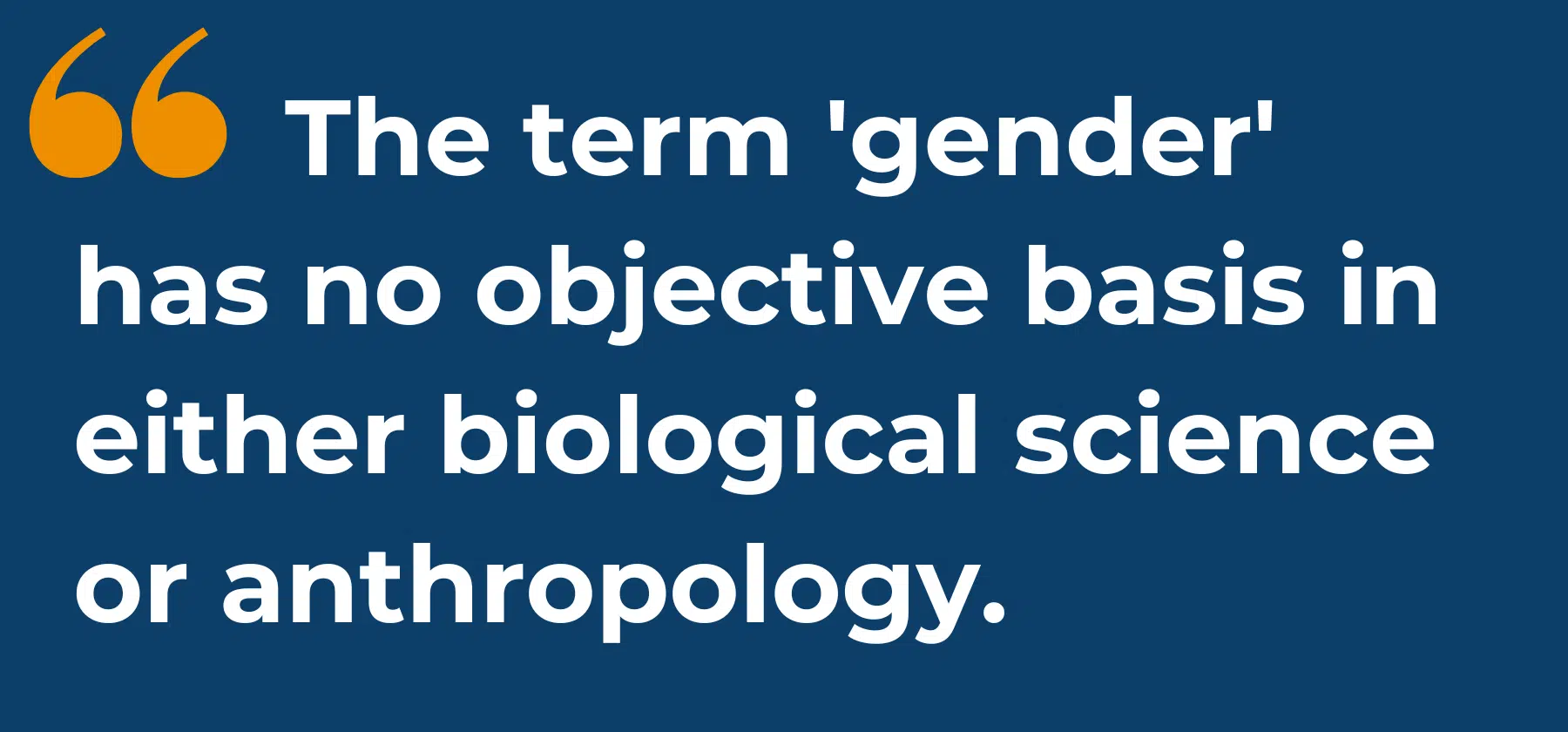

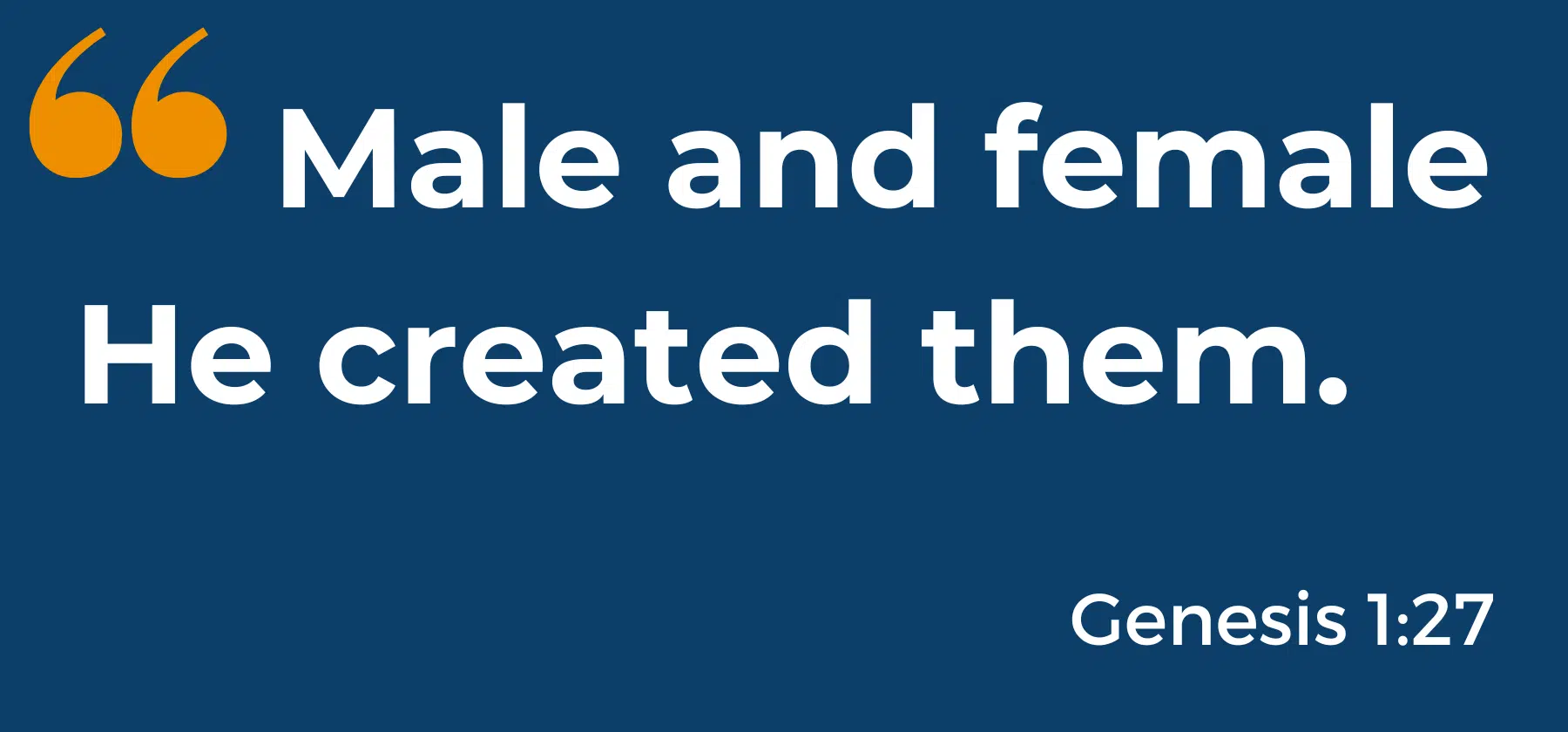
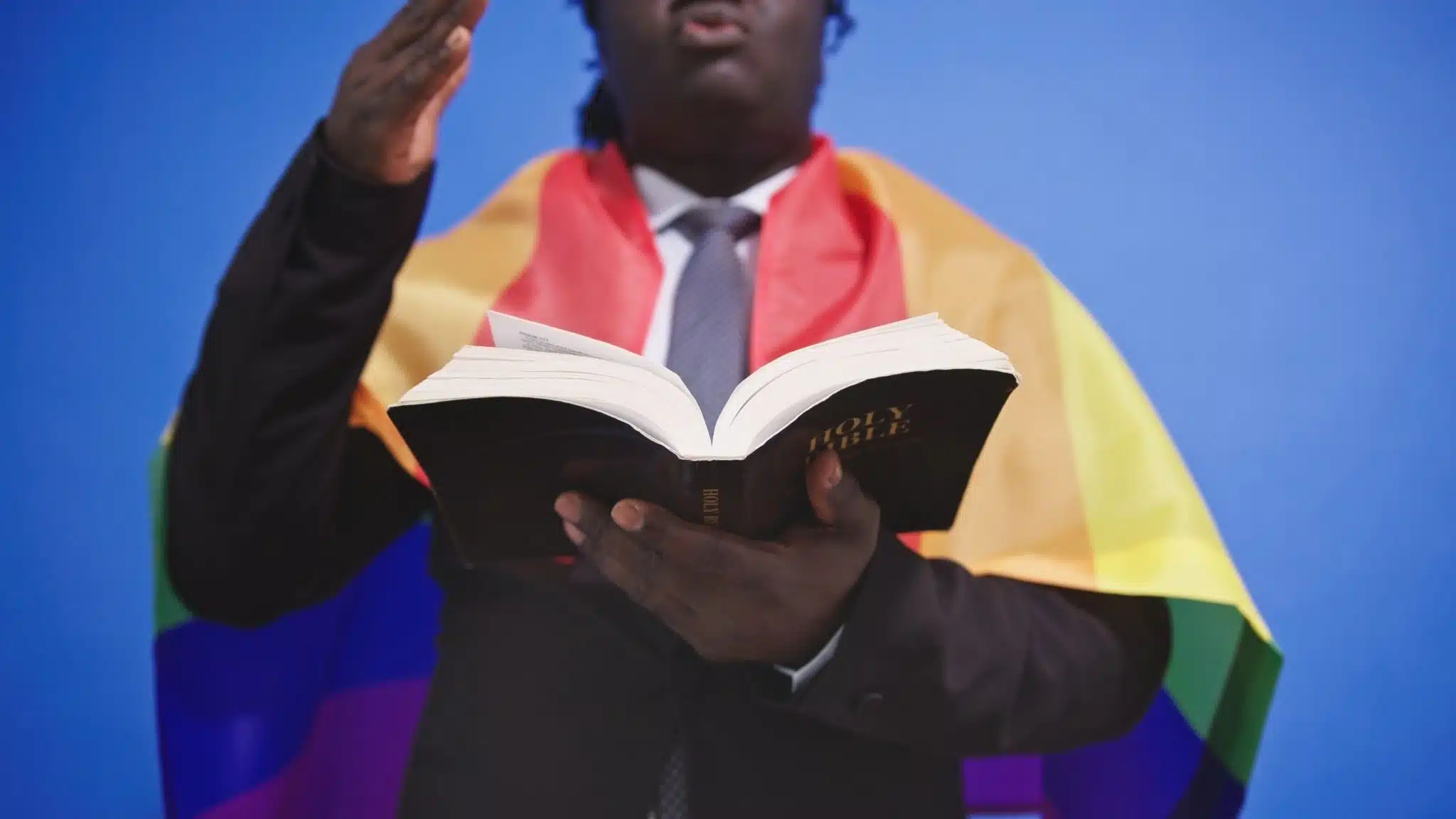
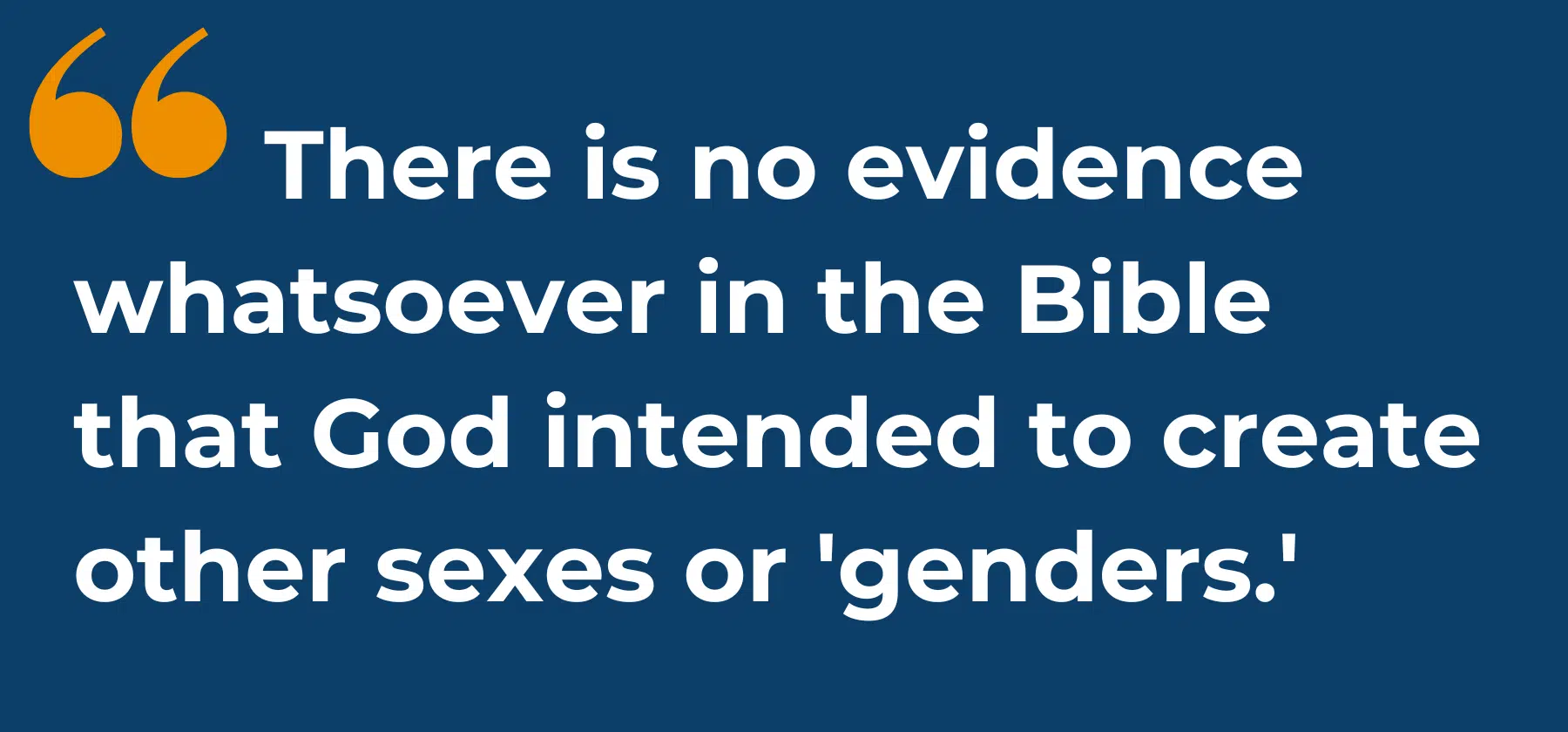
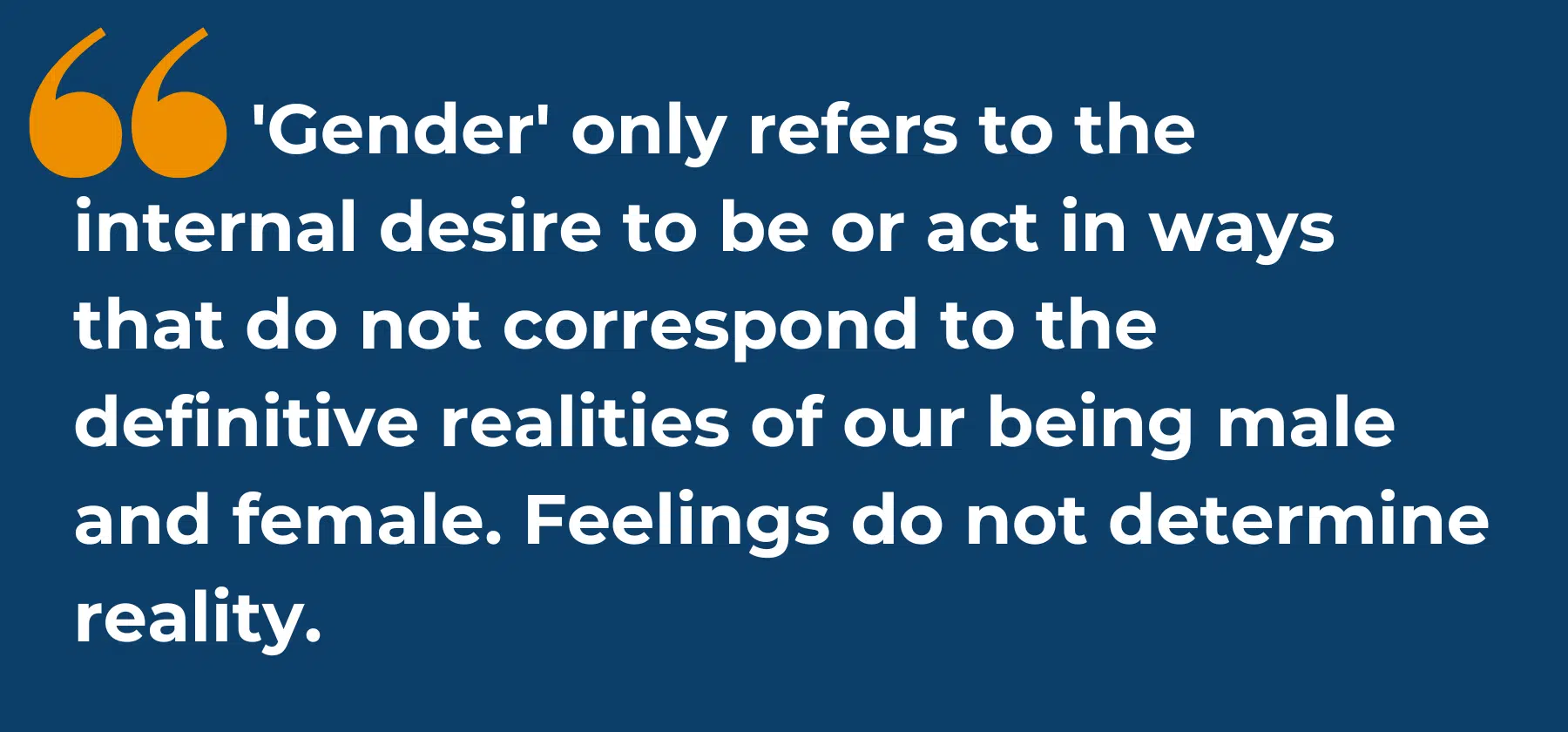












A great article! Just one thing I want to question…
I am uncomfortable with the limitation in the statement that:
“The Bible is indeed inerrant in all that has to do with our salvation.”
I don’t see the quote from CCC #107 as necessarily implying that the inerrancy is limited to “all that has to do with our salvation”, although it might seem to suggest that. In fact the CCC quote implies that EVERYTHING the Bible teaches (properly interpreted) is true by saying that “all that the inspired authors or sacred writers affirm should be regarded as affirmed by the Holy Spirit”. The Holy Spirit cannot deceive!